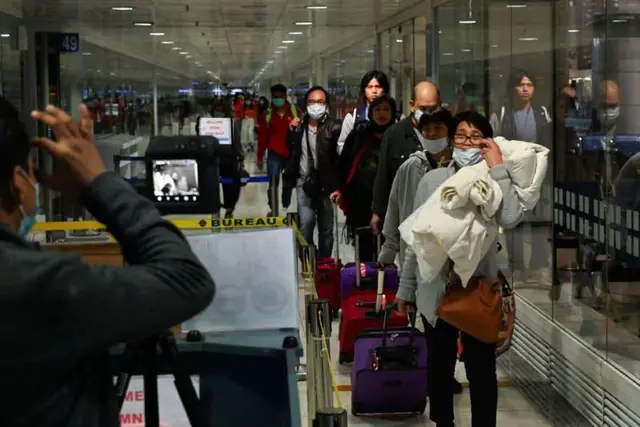More European countries have decided, or said, to strengthen border checks following Germany's decision on Sunday to temporarily reinstate border control amid the ongoing refugee crisis.
Austria on Monday announced it will send 2,200 troops to its borders to help police control the situation.
During a press conference, Austrian Chancellor Werner Faymann said the deployment will primarily oversee humanitarian aid, but will also help in a border control capacity where the need arises.
He stressed that as with Germany's tightened restrictions, the borders would not be closed, and the Schengen Agreement rules would still apply.
Vice-chancellor Reinhold Mitterlehner said the troop deployment would take place with immediate effect, and would mirror Germany's announcement Sunday that it would tighten border controls, saying if they did so Austria would also have to.
This would send a clear signal to persons concerned that the "disorderly crossing of the border cannot take place any longer."
Meanwhile, Slovakia has introduced temporary checks at the Hungarian and Austrian borders, in response to Germany's adoption of the same measure.
"Following the announcement by Germany that it is temporarily introducing checks at the border with Austria, Slovakia has proceeded to introduce temporary border checks on Slovak-Hungarian and Slovak-Austrian border crossings," said Michaela Paulenova from the Slovak interior ministry office's press department.
In regard to the extraordinary situation, Slovak police added an extra 220 officers at the borders. Border crossings have been reinforced as well as select locations at other points along the periphery.
"This is a temporary measure," stressed Paulenova, adding that the ministry couldn't estimate when it would end.
"The stricter mode doesn't mean the end of Schengen," explained Paulenova, in response to the free movement of people in the Schengen zone.
"We're constantly monitoring and coordinating activities with police forces in Austria, Hungary and the Czech Republic," added Paulenova.
The German government decided on Sunday to reintroduce border controls to cope with the rising influx of people.
German Interior Minister Thomas de Maiziere said border controls will take place mainly in Bavaria, noting "The aim is to limit the refugees influx."
"The action will not solve all problems. We need more time and a degree of order on our borders," said Thomas de Maiziere.
According to German Vice-Chancellor Sigmar Gabriel on Monday, up to a million refugees may arrive in Germany in 2015, a figure bigger than the current official estimates of 800,000 asylum applications.
Large numbers of refugees have reached Germany in recent days, with more than 19,000 arriving in Munich, the main point of entry, over the weekend alone.
Gabriel defended on Monday Germany's decision, saying temporary controls were not a permanent closure of borders or suspension of the basic right of asylum, but necessary to maintain control and keep order at the borders.
The vice-chancellor said it was a clear signal to European partners that Germany could not receive all the refugees alone.
In the past week, tens of thousands of refugees had taken the so-called Balkan route and arrived in Germany via Austria, many of them travelling by train to Munich.
In East Europe, Poland is ready to start enhancing its border control in case of any threat, Polish Prime Minister Ewa Kopacz said on Monday.
Moreover, Kopacz required that the control over the external EU borders be stricter.
Belgium also said it is ready to take border measures.
Belgium would "certainly consider" temporarily closing its borders to refugees, the country's secretary of state for asylum and migration Theo Francken said on Monday.
Francken, from the Flemish centre-right N-VA party, made the remarks while speaking to Dutch-language public broadcaster Radio 1.
"If that means that all of a sudden, they come to Belgium, then there is no alternative than to close the borders," Francken said in the radio interview.
"I understand the German decision. If we get into a similar situation, which is currently not the case, it is certainly to be considered," he said.
Francken said that if several EU countries closed their borders, it would create "a cascade effect," putting extra pressure on other states within the Schengen area of free movement.
The minister, however, added, "I do believe in Schengen, because freedom of movement is economically a good thing. We as a nation benefit from Schengen, but should still apply logic when it comes to refugees."
Belgium's neighbor the Netherlands also announced Monday that it would implement extra border controls as the number of refugees reaching the country has surged in past weeks.
Mobile teams of the Royal Netherlands Marechaussee (or gendarmerie force) are going to carry out extra border controls, announced Dutch state secretary for security and justice, Klaas Dijkhoff, at a European extraordinary meeting to discuss the immigration crisis on Monday.
French President Francois Hollande on Monday urged border controls in southern European countries to protect European borders amid the massive influx of refugees and "welcome (them) with dignity."
France and Germany are "extremely insistent" that border control centers be set up in Greece, Italy and Hungary, Hollande said one day after Germany reintroduced border controls on its southern border with Austria to curb thousands of asylum seekers knocking on its doors every day.
Hollande also stressed the necessity to reach common alternatives so that "Europe can enforce its borders" amid the resistance of some eastern European states to accept European Commission President Jean-Claude Juncker's plan of compulsory quotas to redistribute about 160,000 refugees in the EU.
EU interior ministers gathered in Brussels Monday for an extraordinary meeting to discuss the situation and agreed on a plan to relocate 40,000 refugees from Italy and Greece, the latest move of the EU to address the worst refugee crisis in Europe since World War II. Enditem
 简体中文
简体中文

